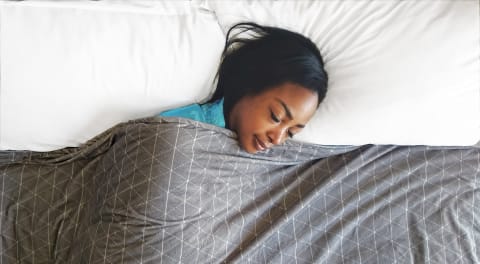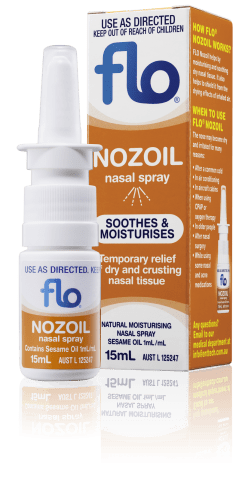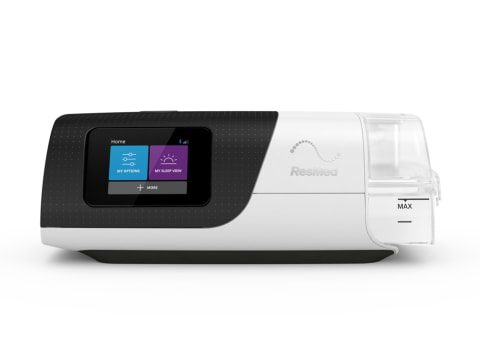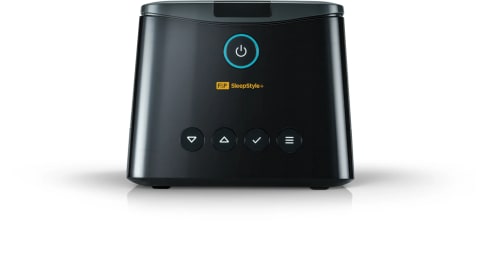CPAP How Does it Work
CPAP: How Does It Work?
Sleep apnea is very common in Australia. In fact, moderate-to-severe obstructive sleep apnea affects around 9–17% of adults. Many people simply wake up tired or snoring loudly without realising they have apnea. CPAP (Continuous Positive Airway Pressure) therapy can be life-changing. A CPAP machine is a bedside device that delivers a constant stream of pressurised air through a hose and mask while you sleep. This gentle airflow holds your throat open, preventing the repeated collapses of the airway that cause breathing pauses and snoring. As a result, oxygen levels stay normal overnight and sleep quality improves – you wake up feeling more rested.
A CPAP mask gently props open the airway at night. By delivering steady air pressure, CPAP prevents the throat from collapsing and reduces breathing interruptions. The result is smoother, more normal breathing and far fewer apnea events.
Who Needs CPAP?
CPAP is usually prescribed for obstructive sleep apnea (OSA), especially moderate to severe cases. In OSA, throat muscles relax too much during sleep, often hundreds of times each night, causing brief breathing stoppages. Without treatment, this can lead to low oxygen levels and daytime drowsiness. CPAP keeps the airway open so you breathe freely. It is also used for certain cases of central sleep apnea or for people with heart failure. Doctors often recommend CPAP if your sleep study shows frequent apneas or if you have significant symptoms like loud snoring and daytime fatigue. Mild sleep apnea might first be managed with lifestyle changes (like weight loss or quitting smoking), but CPAP is the first-line treatment once apneas become frequent. Anyone diagnosed with moderate/severe OSA or central apnoea should seriously consider CPAP.
Matching the Right CPAP to Your Needs
Not all CPAPs are the same. Fixed-pressure CPAP machines blow air at one steady pressure all night, while auto-CPAP (APAP) machines automatically raise or lower pressure in response to your breathing. APAP machines use built-in sensors to detect snoring or airflow changes, then boost pressure just when your airway starts to narrow. There are also BiPAP (bilevel) devices that give one pressure on inhalation and a lower pressure on exhalation, which some people find more comfortablesleepfoundation.org. A sleep specialist will recommend the best type based on your needs and comfort.
The mask style is equally important. Full-face masks cover nose and mouth, nasal masks cover just the nose, and nasal pillows fit under the nostrils. Your face shape, whether you breathe through your nose or mouth, and your preferred sleep position all matter. It often takes trying a few masks to find one that seals well without feeling tight. For example, if you find full-face masks claustrophobic, a nasal pillow might be more tolerable – but if you move a lot during sleep, a more secure mask might suit better. Healthcare providers at Sove CPAP Clinic will work with you to find the right mask style and size – after all, a well-fitted mask is key to effective therapy.
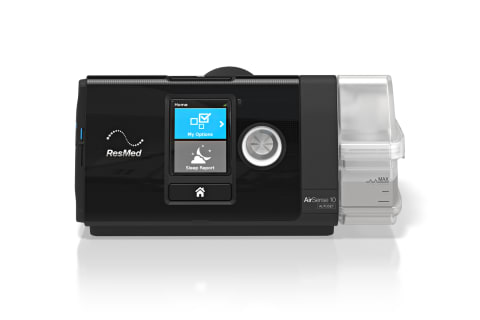 Further $50 Off with code "AUTUMN50"
ResMed AirSense 10 AutoSet 4G CPAP Machine
Further $50 Off with code "AUTUMN50"
ResMed AirSense 10 AutoSet 4G CPAP Machine
Popular CPAP Brands & Travel Machines
In Australia, the main CPAP brands are ResMed, Philips Respironics, and Fisher & Paykel (F&P) Healthcare. ResMed’s machines (like the AirSense 10 and AirSense 11) are very popular locally and offer advanced features like AutoSet and Expiratory Pressure Relief.
Philips Respironics makes the DreamStation. Fisher & Paykel (a New Zealand brand) offers machines like the SleepStyle+, and is known for comfortable masks.
For those on the move, there are smaller travel CPAPs. ResMed’s AirMini is a tiny auto-adjusting CPAP about the size of a smartphone. It even uses special waterless humidifiers called HumidX, so you don’t need to carry a water tank when flying.
Ongoing care plans help keep your CPAP treatment on track
At Sove CPAP Clinic, we know that CPAP therapy is most effective when supported by regular care and expert guidance. That’s why we offer structured ongoing care plans to ensure your treatment stays on track long after you’ve taken your machine home. These plans are designed to optimise your comfort, improve long-term compliance, and adapt your therapy to your changing needs.
With our care plans, you’ll receive regular therapy reviews where we download and analyse your machine’s usage data. This helps us assess how well your treatment is working and make timely adjustments. If your mask becomes uncomfortable or starts to leak, we offer mask refitting services and the opportunity to trial alternative styles.
We also help you stay on top of routine maintenance with scheduled reminders to replace consumables like filters, tubing, and mask cushions. These seemingly small details can have a big impact on your comfort and therapy effectiveness.
Whether you prefer in-person appointments or telehealth, our CPAP specialists are available to support you with pressure adjustments, travel preparation, humidification guidance, and general troubleshooting. We also provide ongoing education so you can confidently manage your equipment at home, along with exclusive patient discounts on accessories and replacement parts.
These care plans are a cost-effective way to maximise the health benefits of your CPAP therapy while reducing the risk of treatment dropout. Whether you’re newly diagnosed or a long-term user, our goal is to help you breathe easier, sleep better, and stay supported.
ALWAYS FOLLOW THE DIRECTIONS FOR USE. CPAP is used for Obstructive Sleep Apnoea treatment. When considering whether a sleep study or CPAP is right for you, speak to your doctor. Medicare criteria and T&Cs apply. Payment plans available for approved applicants only; fees, terms, conditions, minimum amounts and exclusions apply.
FAQs
What happens to your body when you start using a CPAP machine?
Starting CPAP therapy can lead to noticeable improvements in your overall wellbeing, often within the first week. Many people find they sleep more soundly, with fewer awakenings during the night. As a result, they wake feeling more refreshed and energised. Daytime sleepiness and brain fog often improve dramatically, and you may notice better focus and concentration.
CPAP also has benefits for your physical health. Consistent use—ideally more than six hours per night—can help lower blood pressure, reduce the risk of heart-related issues, and enhance your metabolic function. For many, CPAP also improves mood and emotional stability. Snoring typically decreases, as does the likelihood of morning headaches. Overall, your sleep becomes more restorative, which has a positive ripple effect across many aspects of daily life.
How does a CPAP machine know when you stop breathing?
Modern auto-adjusting CPAP machines are equipped with highly sensitive sensors that constantly monitor your breathing. These machines detect subtle changes in airflow, such as snoring, shallow breathing, or complete pauses.
When the machine senses that your airway is narrowing or collapsing, it automatically increases air pressure to keep it open. Once your breathing normalises, the machine reduces the pressure back to your prescribed baseline. These adjustments happen in real-time and are so smooth that most people never notice them during the night.
What’s the proper way to use a CPAP machine?
To get the most out of your CPAP therapy, it’s important to use your machine every night—even during naps. Always put on your mask before turning on the machine, ensuring the mask fits securely but comfortably. A proper seal helps prevent air leaks and ensures effective therapy.
Clean your equipment regularly: wash the mask daily and the tubing weekly using mild soap and water. If your machine has a humidifier, empty and refill it each day with fresh water. You can also use the ramp feature, which starts the pressure at a lower setting and gradually increases it, making it easier to fall asleep.
Adapting to CPAP may take a few weeks, but with consistency and support, it becomes a natural part of your nightly routine.
Does CPAP treatment stop snoring?
Yes, CPAP is one of the most effective solutions for snoring caused by obstructive sleep apnea. Snoring occurs when air vibrates soft tissues in the throat due to a partial airway blockage. CPAP therapy keeps your airway open with steady air pressure, which prevents these vibrations.
Many users notice a significant reduction in snoring from the very first night of treatment. Partners of CPAP users often report quieter, more peaceful sleep as well.
Are there downsides to using CPAP machines?
While CPAP therapy offers significant health benefits, it can come with a few initial challenges. Some people experience dryness in the nose or mouth, which is often resolved with the use of a humidifier. Nasal congestion can be eased with saline sprays or by adjusting the humidification settings.
Mask-related discomfort, such as skin irritation or pressure marks, is usually resolved by trying a different mask style or size. If you feel claustrophobic wearing a full-face mask, a more minimal nasal pillow mask might help you feel more at ease.
Some users experience bloating or air swallowing (aerophagia), which can often be managed by adjusting pressure settings or transitioning to a BiPAP machine if necessary. These issues are typically short-lived, and with the right support and adjustments, most people find CPAP therapy both comfortable and life-changing.
Our team at Sove CPAP Clinic is always here to help you work through any concerns and make sure your therapy stays on track.




